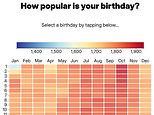If today is your birthday, we have some bad news for you — your ‘special’ day really isn’t that exceptional. Data from the Office for National Statistics (ONS) reveals that today, 27 September, is the most common day to be born in the UK.
In fact, the four most common birthdays — 27 September, 26 September, 25 September, and 23 September — have all taken place this week. This pattern shows that more babies are conceived in the weeks around Christmas than at any other time of the year.
In contrast, Christmas Day itself sees some of the fewest births, along with Boxing Day and New Year’s Day.
### How Unique Is Your Birthday?
Wondering just how unique your birthday is? According to the Daily Mail’s analysis of official ONS statistics, the 10 most common birthdays all occur in late September. September 27 tops the charts, with an average of 1,939 babies born on that date each year.
These figures are based on births in England and Wales between 1995 and 2024. At the other end of the scale, Boxing Day is the least common birthday, with just 1,302 boys and girls born on 26 December each year.
Following Boxing Day, Christmas Day itself ranks as the next least common birthday (1,370 births), closely followed by New Year’s Day (1,536 births).
### Birth Trends and Statistics
Between 1995 and 2023, there were 19,051,773 live births in England and Wales. The number of births varied by year, from a high of 729,674 in 2012 to a low of 591,072 in 2023. There was a slight increase in births between 2023 and 2024, with 3,605 more arrivals.
Despite the drop in overall birth numbers in recent years, the most and least popular birthday dates have remained fairly consistent.
### Why Are September Birthdays So Common?
Analysts suggest one reason September birthdays are so common is that couples might plan to have children who are the oldest in their school year.
Others believe it comes down to couples having more sex over the Christmas break, leading to more conceptions during that time.
### Why Are There Fewer Births Over Christmas and New Year?
The ONS explains the lower number of births during the Christmas and New Year period by pointing to the many bank holidays in this timeframe.
Hospitals generally only deliver natural births and carry out emergency caesareans over the holidays. Meanwhile, induced births and elective caesareans are often scheduled for alternative dates, leading to fewer births on these key festive days.
—
So, whether your birthday falls on the most common or the rarest date, it’s interesting to see how our national holidays and celebrations influence birth patterns across the UK.
https://www.dailymail.co.uk/sciencetech/article-15136221/today-birthday-27-September-tool-stacks.html?ns_mchannel=rss&ns_campaign=1490&ito=1490
